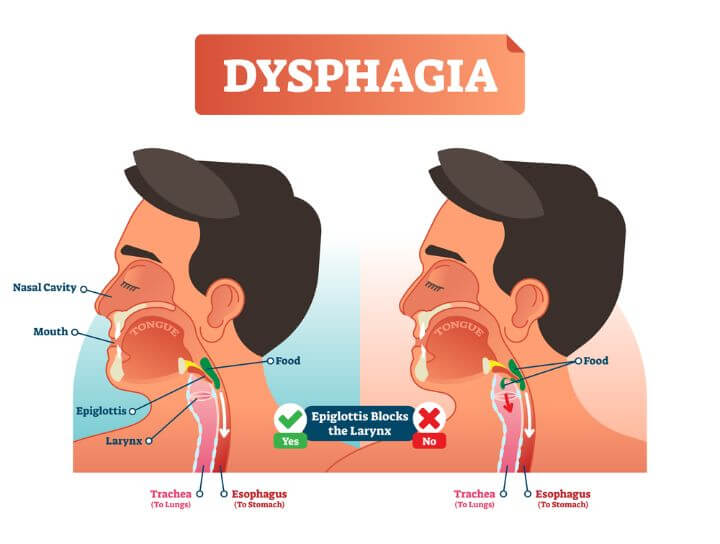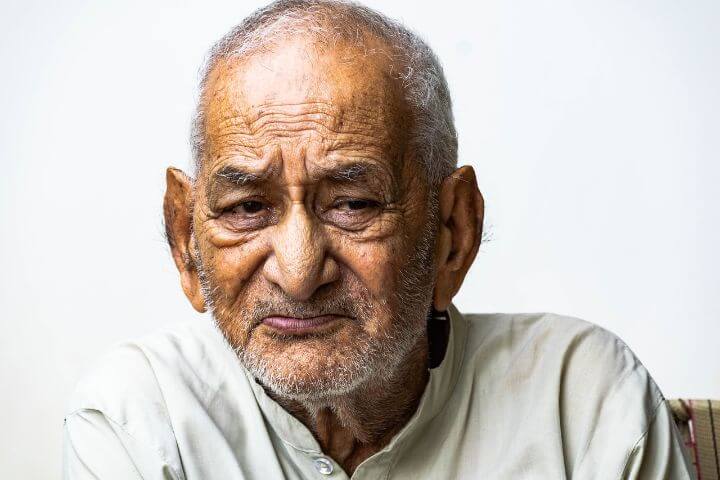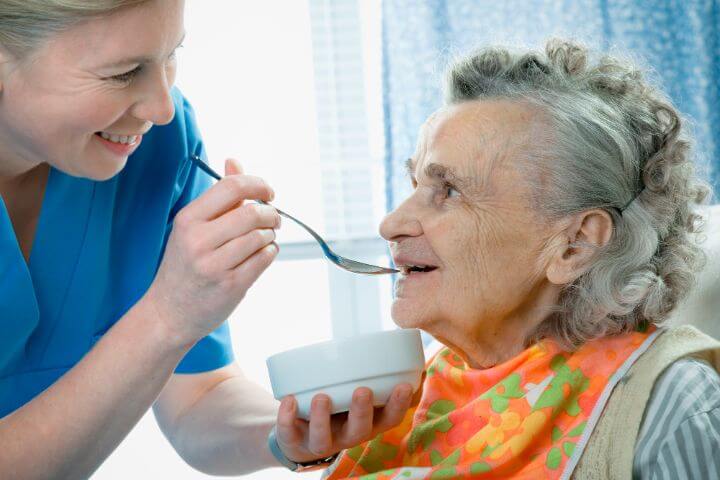As we age, there are certain conditions we can develop that make our life more difficult and things we have to be aware of. Over the course of time, certain parts of our body start to wear out and we may have difficulty with the muscles involved in completing the action.
One of the more common issues people start to experience as they age is known as dysphagia or losing the ability to swallow. There are a few signs you can look for to see if your loved one is starting to lose their ability to swallow, and what you can do to help them.
Contents
What, Exactly, Is Dysphagia and What Causes It?
In order to understand what to look for in your loved one it’s important to know exactly what this condition is and what causes it.
What Is Dysphagia?
This is a condition where people find it difficult to completely swallow specific foods and/or liquids. In some rare cases, people may completely lose the ability to swallow altogether and this is much more severe than just not being able to swallow certain foods.
In certain conditions, it may be painful for someone with this condition to swallow. This condition means a person has to thoughtfully put effort into swallowing foods, when most of us do this action subconsciously without too much thought or effort.
Eating foods too fast can exacerbate this condition, or increase the chances of choking on foods. It’s important for people with this condition to make sure they properly chew their food before trying to swallow – and this could mean extra chewing so food is into smaller pieces.
The foods someone has difficulty are probably going to be unique to them as this condition doesn’t always affect everyone in the same way.
What Causes This Condition?
People who live with dysphagia usually have another condition, and the difficulty with swallowing is secondary to the other condition.
This could include conditions like
-
- A medical condition that affects the nervous system like dementia, multiple sclerosis, stroke or a head injury.
- Cancer – specifically cancer in the mouth or esophageal cancer.
- GORD, or another gastro-intestinal condition where stomach acid leaks back up into the esophagus.
- Children may develop this condition as a result of having cerebral palsy.
If the cause is neurological for someone it means that the muscles are weakened, and they are unable to physically push the food from your mouth down your esophagus.
The damage to these muscles – depending on the condition – may be irreversible so your loved one may have to look at alternative methods of nutrition or working with a physical therapist to find exercises to help them out.
There could be other reasons or conditions that create this difficulty with swallowing, and it may be unique to each person. If your loved one is having difficultly swallowing that is newly developed you will need to discuss this with their doctor as they will need an assessment to determine what the cause is for them.
Symptoms of Dysphagia
You may notice some changes in your loved one, but can’t exactly put your finger on what is causing those changes or why they’re happening.
Some of the things to look for when it comes to dysphagia could be
- Choking or coughing when they are eating and/or drinking
- Often bringing food back up, even through their nose
- The constant sensation that a particle of food is truck in their throat and they cannot completely swallow it
- Persistent drooling
- Unable to completely chew food properly before swallowing
- A wet sounding voice when eating and/or drinking
When someone has been living with dysphagia for a while, without it being diagnosed, you may notice they have had significant weight loss and/or repeated chest infections (due to food being stuck in their throat or chest and being unable to totally swallow).
Seeking Medical Advice
If you have noticed that your loved one is having troubles with eating and swallowing, or they are often choking on their food when eating then it might be time to talk to a doctor about it.
A doctor can assess their symptoms and determine if this is what is happening to your loved one, and how to proceed from here.
Investigation into these symptoms can also help to rule out other conditions – especially if your loved one doesn’t have any known other medical conditions that may be causing this to happen.
Treating Dysphagia
Once your loved one is diagnosed with dysphagia, there are a number of treatment options available to help make the symptoms easier to live with.
The type of treatment your loved one receives will likely depend on whether there’s another medical condition that is likely causing this to happen.
A cure usually isn’t possible, but there are forms of treatment that can make the condition easier to live with.
Types of Treatment May Include
-
- Speech and language therapy, which will help your loved one to recover from swallowing techniques. A physical therapist will be able to show them special exercises to do at home, and this will help to strengthen the muscles needed for swallowing.
-
- Changing their diet to make it easier to swallow. This may include incorporating more thick liquid foods (like smoothies and protein shakes) so it’s easier to swallow. Your loved one may need to meet with a registered dietitian to make sure their nutritional requirements are still being met.
-
- Alternative forms of feeding. Changing to alternative forms of feeding – like tube feeding through their nose or stomach – may be hard for your loved one to accept so this isn’t always going to be the first choice. However, depending on the severity of the dysphagia your loved one is living with this may be the only option for them so they can continue to eat without issues.
-
- Surgery to widen your loved one’s esophagus. Doing this will mean stretching the oesophagus by placing a stent into it. If there was an obstruction – like a tumor caused by cancer – then this may be a great option as your loved one isn’t affected by muscles weakening. A doctor will be able to determine if this is the best option for your loved one.
Complications Experienced by Dysphagia
Like many other medical conditions, having dysphagia can cause other complications in the long-term.
One of the most common problems people living with this condition experience is a lot of coughing or choking – that feeling that food is “going down the wrong way” and essentially it blocks their airway. Having this happen can actually lead to chest infections like aspiration pneumonia (which requires very urgent medical treatment if it happens).
Aspiration pneumonia happens when someone accidentally inhales something, like a small piece of food, and it get stuck in their airway.
How do you know if someone has aspiration pneumonia?
-
- A wet, or gurly, voice when someone is eating and/or drinking
- Coughing or eating constantly when eating and/or drinking
- Difficulty breathing (or their breathing may seem shallow and rapid)
Those who have been diagnosed with this issue may know that certain foods seem to cause more choking hazards than others for them, and therefore they may avoid eating these foods for fear of choking.
In the long-term, avoiding certain foods can actually lead to malnutrition or dehydration in your loved one. It could also affect your loved one’s quality of life because they may avoid social situations and eating with their friends and family because they don’t want to cause a scene due to choking.
It’s important to remember that if your loved one has been diagnosed with this condition and you notice they are really not able to swallow you need to call emergency services as soon as possible because they are at a higher risk of choking and will need medical attention quickly.
Risk and Prevention
There are a couple of risk factors for developing dysphagia, which are
Aging
Over the course of our lives, the muscles that allow us to swallow will weaken a bit and this makes the elderly more at risk for developing difficulties with swallowing.
It’s important to note that there’s a big difference between difficulties swallow and developing dysphagia. Dysphagia is not usually considered a typical part of aging, and it’s not something that most people will develop.
Specific Medical Conditions
As mentioned, there are certain medical conditions that affect the nervous system, and that makes it harder for them to swallow over time.
Swallowing difficulties, unfortunately, cannot always be prevented but the risk of an episode happening can be minimized a bit.
The best way to reduce the risk of choking is to make sure your loved one is eating slowly and taking their time to chew their food adequately. Early detection and noticing these changes is important for managing this condition.
Sum Up
You may think that the issues your loved one is having are just a natural part of aging – and to some extent yes it does happen as people age.
However, severe issues with swallowing and frequent episodes of choking are not considered normal and you should definitely encourage your loved one to make an appointment with their doctor and discuss what’s going on.





